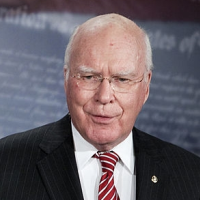U.S. Congressional Committees Move to Rein in Civil Liberties Watchdog
 Sen. Patrick Leahy (photo: Getty Images)
Sen. Patrick Leahy (photo: Getty Images)
By Charlie Savage, New York Times
WASHINGTON — A leading Democrat in Congress is pushing back against an effort to impose new constraints on a civil liberties watchdog agency that investigates the nation’s security programs.
The agency, the Privacy and Civil Liberties Oversight Board, is a bipartisan five-member panel that Congress created after a recommendation by the commission that investigated the Sept. 11, 2001, terrorist attacks. Its members and staff have security clearances and a mandate to investigate government practices that affect individual rights.
The Senate and House intelligence committees have increasingly sought to impose new rules on the board’s work, including a series of proposals in a pending intelligence authorization bill. But in a letter this week to Senate Intelligence Committee leaders, Sen. Patrick J. Leahy, the top Democrat on the Judiciary Committee, demanded that the proposals be withdrawn.
Since the independent board began fully operating three years ago, it has produced a high-profile report about the once-secret National Security Agency program that collected bulk records of Americans’ phone calls. It called the program ineffective and illegal and said it should be shut down. Congress later did so by enacting the USA Freedom Act.
The oversight board also issued a report that brought to light new details about how the warrantless surveillance program authorized by the FISA Amendments Act worked. It is currently scrutinizing programs that operate under Executive Order 12333, which sets rules for espionage activities that Congress has left unregulated by statute.
In the letter, obtained by The New York Times, Leahy, D-Vt., described the provisions as “completely unacceptable” and “misguided.” He deplored what he portrayed as an emerging pattern of efforts by the intelligence panels to undermine the oversight board’s independence and authority. He also said any proposed changes to the board should go through the Judiciary Committee.
The dispute traces back to last spring, when the chairman of the oversight board at the time, David Medine, wrote an essay proposing that its mandate be broadened to also examine proposed targeted killing operations. In response, the two intelligence committees added a provision to the annual intelligence authorization law last year that barred the board from addressing covert activities.
The versions of this year’s intelligence bill by the House and Senate committees would go further. For example, the Senate bill would narrow the oversight board’s jurisdiction to Americans’ rights, not the privacy of foreigners.
That proposal comes at a time when the Obama administration has highlighted the privacy board’s role in negotiations over a trans-Atlantic agreement for handling private data amid concern in Europe about using internet and technology companies based in America. Those concerns came after leaks by the former intelligence contractor Edward J. Snowden about NSA surveillance programs.
In addition, the House version would change budgeting rules for the oversight board so that it would have to shut down if Congress did not act every year to reauthorize it to spend money. The versions in both chambers would require the board to tell the intelligence committees and the heads of intelligence agencies what it is investigating.
Medine, who stepped down as the board’s chairman on July 1, said that the proposed changes were unwise in light of what was exposed by the Snowden leaks.
“The lesson from Snowden is how critical it is to have democratic debate and oversight of our intelligence community to give it credibility both nationally and internationally,” he said. “Now we have the intelligence committees trying to undercut that and push the intelligence community back into the shadows again.”
Sen. Ron Wyden, D-Ore., an Intelligence Committee member, has also objected to provisions in the bill that would weaken the oversight board, as has a coalition of technology companies and privacy advocates.
The chairman of the Senate Intelligence Committee, Sen. Richard M. Burr, R-N.C., did not respond to a request for comment. But the chairman of the House Intelligence Committee, Rep. Devin Nunes, R-Calif., pushed back.
“As is clear from the text of the bill, the Intelligence Authorization Act does not undermine PCLOB in any way — it simply establishes mechanisms to keep Congress fully informed of what the board is doing so Congress can exert proper oversight,” Nunes said in a statement. PCLOB is an acronym for Privacy and Civil Liberties Oversight Board.
He also portrayed the fear that Congress might not act each year to authorize the oversight board as “simply false,” saying it could do so in a spending bill even if the annual intelligence authorization bill failed.
But Democratic leaders signaled openness to changing the bills. Sen. Dianne Feinstein of California, the vice chairwoman of the Intelligence Committee, said in a statement, “We’re aware of Sen. Leahy’s letter, and I’m happy to work with him to resolve his concerns.”
And Rep. Adam B. Schiff of California, the top Democrat on the House Intelligence Committee, said he shared Leahy’s concern.
To Learn More:
Will the Federal Privacy Board Finally Do Something? (by Noel Brinkerhoff, AllGov)
Senate Finally Confirms Head of Privacy and Civil Liberties Board after a Year and a Half (by Noel Brinkerhoff, AllGov)
Obama Nominees to Privacy and Civil Liberties Board Finally Get a Hearing (by David Wallechinsky and Noel Brinkerhoff, AllGov)
- Top Stories
- Unusual News
- Where is the Money Going?
- Controversies
- U.S. and the World
- Appointments and Resignations
- Latest News
- Musk and Trump Fire Members of Congress
- Trump Calls for Violent Street Demonstrations Against Himself
- Trump Changes Name of Republican Party
- The 2024 Election By the Numbers
- Bashar al-Assad—The Fall of a Rabid AntiSemite






Comments